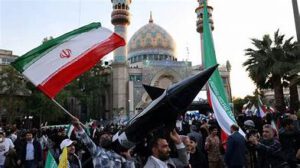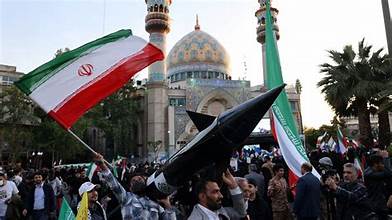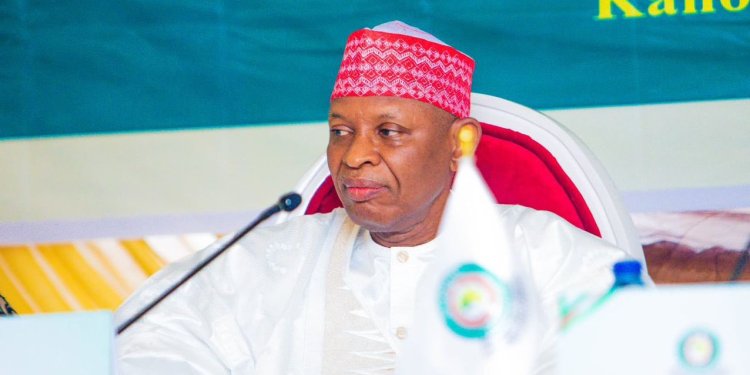
By Amah
As Israel and Iran light up the Middle East skies with missiles and bombs, it draws moment of reality for the Islamic Republic which has for years promoted horror and trepidation with its terrorist proxies in Gaza, Lebanon and Yemen.
When the Hamas terrorists invaded southern Israel on October 7, 2023, Iran overtly provided support for the group which was roundly condemned by other Arab countries including Jordan and the Palestinian Authority in West Bank as strikingly reckless. Everyone knows that Hamas is a very prominent terror proxy of Iran. It is more murderous than Hezbollah in Lebanon and Houthi rebels in Yemen. Hamas is the dread of Israel and despot to the ruled Gazan population who deserve peace more than anything else.
Besides igniting a blazing Israeli anger, the Hamas attack on Israel targeted the vulnerable-elderly, women some of whom were brutally raped, children and even babies whose grizzly beheading was captured in classified videos shown to representatives of global allies. The Hamas attack also belittled the American influence and alliance with Israel which every president of the United States-whether Democrat or Republican-have pledged to uphold as ironclad.
As Israel responded, Hamas’ top leaders flew private jets to Qatar and Iran where they were given some sense of immunity; leaving the vulnerable Gazan population to bear the brunt of their mess. And Israel has also fulfilled its vow of tracking its assailants down and picking them out in point-and-kill precision strikes that ignored diplomatic and sovereign lines. As at today, the top level Hamas operatives that masterminded the invasion of Israel, killing of 1200 citizens within two hours, and abduction of some 250 hostages from their homes have been decimated. And new replacements no longer find luxury in operating the Iran-supported terror network.
The two years of ground offensive in Gaza and Southern Lebanon also exposed deliberate development of very costly terror infrastructure that have been obviously premeditated for holing up and funneling of victims of abduction to unreachable hands of rescuers.
But as the Gaza war brings home the stark realities of hosting Israel’s enemies in Lebanon, Gaza or Yemen; the Iranian authorities began to feel its vulnerabilities. The precision take-out of the group’s political leader, Ismail Haniyeh, in Tehran, brought Iran to jolting reality of its mistakes and prompted the government to reignite its weapon programmes to at least serve as deterrent to its angry enemies, including the United States whose citizens were also killed and abducted by Hamas.
Again, the hosts of Iranian terror proxies are also no longer comfortable with their relationship with the terror octopus whose tentacles attract the angry birds! With destructions in Lebanon, Gaza and Yemen visible to Arab neighbors who have wisely invested their petroleum wealth in building modern cities and trade centers, Iran has now become a vulnerable leader of terror packs that attract only wars.
Iran’s return to its nuclear programme, presumably for energy supply purposes, was also ill timed. It came at time of high security tension associated with Tehran’s massive investment in terror architecture in the region. It also coincided with Iran’s massive importation of fighter jets from Russia and China in apparent realization that it was now the target of Israeli anger. Tehran is visibly fidgety and panicky in its persistent warnings about attacking American interests in the Middle East if attacked. It exposed its self guilt in the actions of Hamas, Hezbollah and Houthi rebels. Fears in Tehran heightened as it watched closely as its terror proxies in Gaza, Lebanon and Yemen get seamlessly neutralized by the very Israeli forces it has spent fortunes to break.
The unfolding scenarios come just years after Iran started rebuilding confidence with its estranged neighbors, including Iraq and Saudi Arabia after protracted power feud. With the feudal Middle East, Iran was regarded as regional terror that menaced its surroundings. It earned itself the dread of regional neighbors as it churned out massive numbers of drones and missiles from local factories. But it also attracted to itself the attention of spy agencies that monitored every activity in its arsenal build-up.
Thus, it was not difficult for the International Atomic Energy Agency (IAEA) raise a flag of breach in the Iranian nuclear programme, corroborating long held views by Washington that Tehran must downgrade its uranium enrichment or face consequences. No one was expecting Iran to admit its effort towards production of atomic bomb which is prohibited under the global nuclear non-proliferation treaty.
Intelligence sources informed The Oracle that breached clear limits for civil use of nuclear power, explaining the insistence of the United States that it must open up its facilities for inspection by the IAEA or face consequences.
Under pressure from the IAEA, under watch by Israel and under threat by the United States, Iran lately started gravitate towards war fatigued Russia; helping Moscow with missiles and drones in trade deals for war planes and sundry munitions. Its recent procurements tend to upgrade its war readiness against Israel and other American locations in the Middle East; and thus Tehran suddenly returned to its hard-line position in its nuclear negotiations with the US. And this was a strategic blunder that opened opportunity for legitimate attack from Israel on Friday.
The first successful salvo of aerial bombardment by Israel was returned with massive wave of missiles from Iran as the two nations backed by the United States and Russia respectively turned their homeland into test grounds for war technology while guardian superpowers cheer them up.
Between Saturday and Sunday, Israel and Iran traded fresh waves of attacks on each other, killing scores and raising fears of a wider conflict. Israel has obviously continued to show superior firepower with precision strikes and premium casualties while Iran proves that it has massive stock of inexhaustible missiles to continue overwhelming Israeli aerial defence systems.
Interestingly, U.S. President Donald Trump sternly warned Tehran not to strike any U.S. targets, laying credible proposition to finish up the job in the event of misfire by Tehran.
As at Sunday evening, Israeli rescue teams counted at least 10 people, including children, killed, raising the two-day toll to 13.
Iran officially counted 78 people killed on Friday and scores more have died since, including in a single attack that killed 60 on Saturday. The Israeli attack on Friday morning wiped out the top echelon of Iran’s military command and damaged its nuclear sites, just as Tel Aviv vows of sustained campaign until its list of targets is exhausted. Those attacked on Saturday evening included two “dual-use” fuel sites that supported military and nuclear operations
The Israeli military warned Iranians living near weapons facilities to evacuate, as Prime Minister Benjamin Netanyahu pledged that “Iran will pay a heavy price for the murder of civilians, women and children.”
Israeli President Isaac Herzog said the country was at a historic crossroads. “This is not just our struggle. This is the struggle of all who seek peace, stability, and a hopeful future in the Middle East,” he said in a video statement.
President Masoud Pezeshkian said Iran’s responses will grow “more decisive and severe” if Israel’s hostile actions continue.
Local media reports quoted Israeli authorities as saying that some 22 of Iran’s 270 ballistic missiles fired over the past two nights breached Israel’s anti-missile shield.
President Trump continues to laud Israel’s offensive while denying Iranian allegations that the U.S. has taken part in it. He warned Tehran not to widen its retaliation to include U.S. targets.
“If we are attacked in any way, shape or form by Iran, the full strength and might of the U.S. Armed Forces will come down on you at levels never seen before,” he said in a message on Truth Social. “However, we can easily get a deal done between Iran and Israel, and end this bloody conflict.”
He has repeatedly said Iran could end the war by agreeing to restrictions on its nuclear programme. But Tehran said it would not negotiate while under Israeli attack.
Trump and Russian President Vladimir Putin spoke on Saturday and said they do not rule out a return to negotiations on Iran’s nuclear programme. While the Kremlin quotes Putin as condemning Israel’s operation, Trump described events in the Middle East as “very alarming.”
Trump declared on social media that Putin who is under a different wave of sanctions over his war in Ukraine “feels, as do I, this war in Israel-Iran should end.”





